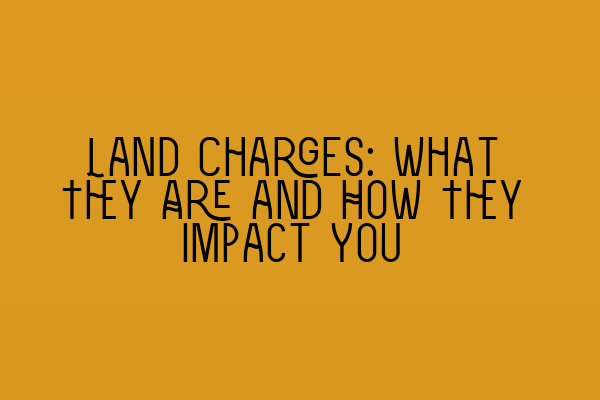Land Charges: What They Are and How They Impact You
As a property owner or someone looking to buy a property, it’s important to understand the concept of land charges and how they can impact you. Land charges are legal obligations or restrictions that affect a piece of land. They can be registered against the land and are binding on both the current owner and any subsequent owners. In this blog post, we will explore what land charges are, the different types of land charges, and how they can affect your property rights.
Types of Land Charges
1. Restrictive Covenants: Restrictive covenants are agreements that limit the use or development of land. They are often imposed by the original developer or previous landowners to protect the character and value of the property. For example, a restrictive covenant may prohibit the construction of additional structures or the running of certain businesses on the land. These restrictions can impact your ability to make alterations to the property or use it for certain purposes. It is essential to review any existing restrictive covenants before purchasing a property to ensure they align with your intended use.
2. Easements: Easements are rights granted to another party to use or access a portion of your land. Common examples of easements include rights of way for utilities, such as electricity, water, or gas, or granting access to neighboring properties through your land. While an easement does not transfer ownership, it can limit your use of the land and may require you to grant access to others. It is crucial to understand the nature and extent of any easements on the land you own or are considering purchasing.
3. Mortgages: When you take out a mortgage to finance the purchase of a property, the mortgage lender registers a land charge against the property. This charge secures the lender’s interest in the property until the mortgage is fully paid off. If you fail to make mortgage payments, the lender may have the right to repossess and sell the property to recover the outstanding debt. It’s vital to ensure you understand the terms and conditions of your mortgage agreement to avoid any potential issues in the future.
4. Liens: Liens are financial claims against a property due to unpaid debts. They can be registered by creditors, such as contractors or suppliers who have provided services or materials for the property but haven’t received payment. If a lien exists on a property you are interested in buying, it can present challenges. It’s crucial to investigate any existing liens and ensure they are resolved before completing the purchase to avoid potential legal complications.
5. Planning Obligations: Planning obligations, also known as Section 106 agreements, are legal requirements imposed by local planning authorities on developers. These obligations often arise when planning permission is granted for large-scale developments. They may include requirements to provide affordable housing, contribute to local infrastructure, or allocate land for community use. Planning obligations can indirectly impact property owners within the development area, as they may be subject to community charges or restrictions on their property.
Impact on Your Property Rights
Land charges can significantly impact your property rights and ability to use and develop your land as desired. Failing to recognize or address these charges can lead to legal disputes, financial liabilities, and limitations on your property’s value. Therefore, it is crucial to conduct thorough due diligence before purchasing a property, including obtaining a land charges search.
A land charges search is a comprehensive investigation of the charges registered against a property. It provides crucial information about existing restrictions, obligations, and liabilities that may impact your property rights. Engaging a solicitor experienced in property law is essential to ensure a thorough search is conducted and that you fully understand the implications of the land charges on your property.
Conclusion
Understanding land charges and their impact on property ownership is vital for anyone involved in buying or selling properties. Restrictive covenants, easements, mortgages, liens, and planning obligations are just a few examples of land charges that can significantly affect your property rights. Conducting a land charges search and seeking legal advice are crucial steps to protect your interests and avoid potential complications.
To enhance your knowledge further, we offer SQE preparation courses such as our SQE 1 Practice Exam Questions and SQE 1 Practice Mocks FLK1 FLK2. These courses will help you develop a solid understanding of property law and practice questions relevant to the SQE exams.
For more information on our SQE preparation courses and exam dates, please visit our website. Our expert team at SQE Property Law & Land Law is here to support you in your journey to becoming a qualified solicitor.
